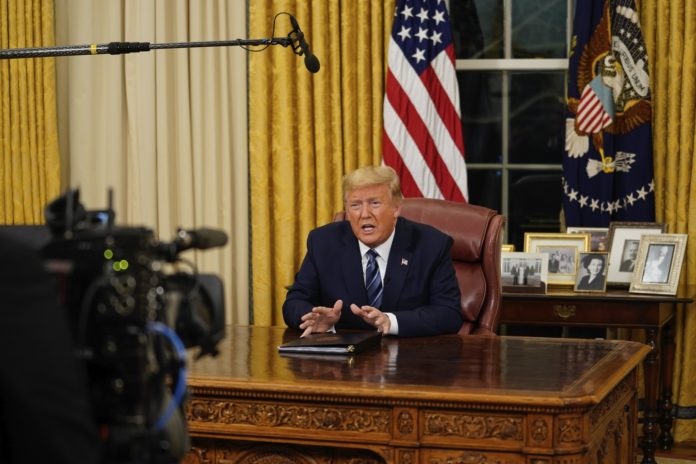
By Matthew Muir | Staff Writer
Updated: 8:30 p.m., Friday, March 13, 2020.
President Donald Trump declared the coronavirus pandemic a national emergency Friday.
Trump delivered the announcement from the White House Rose Garden and said the declaration will allow the Federal government to more effectively combat the disease.
“To unleash the full power of the Federal Government in this effort today I am officially declaring a national emergency. Two very big words,” Trump said. “The action I am taking will open up access to up to $50 billion … for states and territories and localities in our shared fight against this disease.”
Trump’s emergency orders will also allow Secretary of Health and Human Services Alex Azar to “immediately waive provisions” of certain laws to allow healthcare providers “maximum flexibility” in their response to COVID-19 cases.
The declaration comes less than 48 hours after Trump announced a 30-day ban on travel from Europe to the United States in an Oval Office address Wednesday night. The travel ban will take effect “Friday at midnight,” Trump said, and will include exemptions for Americans who have been screened for the virus.
“These restrictions will be adjusted subject to conditions on the ground,” Trump said. “There will be exemptions for Americans who have undergone appropriate screenings, and these prohibitions will not only apply to the tremendous amount of trade and cargo but various other things as we get approval. Anything coming from Europe to the United States is what we are discussing.”
After the address, administration officials scrambled to correct the President’s remarks. Ken Cuccinelli, acting deputy secretary of the Department of Homeland Security, said in a tweet the restrictions “would not apply to American citizens or legal permanent residents or their families.”
Trump himself took to Twitter to clarify his remarks, saying “[t]he restriction stops people not goods,” and that “trade will in no way be affected.”
The global number of known COVID-19 cases surpassed 115,000 Wednesday, of which more than 1,000 are in the United States.
The ban does not include the United Kingdom. Britain has identified at least 460 COVID-19 cases within the country but is no longer part of the European Union, which Trump criticized in his address for not restricting travel from “hotspots” such as China. Trump said the United States’ response to COVID-19 is “unprecedented.”
“This is the most aggressive and comprehensive effort to confront a foreign virus in modern history,” Trump said. “I am confident that by … continuing to take these tough measures, we will significantly reduce the threat to our citizens, and we will ultimately and expeditiously defeat this virus.”
Baylor has a number of study abroad programs in Europe this semester, including in Italy. The Mediterranean country is the European epicenter of the pandemic, and its Prime Minister recently announced all shops in the country other than food stores and pharmacies will close as Italy works to stop the virus’ spread.
Lori Fogleman, Baylor’s assistant vice president for media and public relations, said the university is making arrangements to bring students back to the United States.
“The university has recalled all international travelers to the United States, including all study abroad and mission trips. We are currently working on arrangements for Baylor travelers to return to the U.S., including those from European locations,” Fogleman said. “The University is evaluating upcoming study abroad programs and mission trips with our global partners and guidance from the CDC and U.S. Department of State and will communicate any decisions that are made.”
In a Presidential Perspective email Friday, Dr. Linda Livingstone, president of Baylor University, announced the cancellation of all study abroad programs and international mission trips for Summer 2020.





